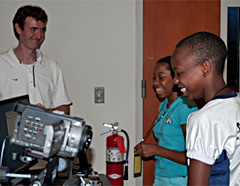Learning Through Experience
Students from North Bend Elementary/Middle School in Baltimore have a better grasp on their potential careers, thanks to a program called Learning Through Experience (LTE) offered by the Shriver Center at UMBC. LTE is a component of the year-long Adventures in College and Career Exploration in STEM (ACCES) program, funded by the Maryland Higher Education Commission. Cherry Hill Elementary/Middle School also serves as an ACCES partner.
The LTE program promotes learning by increasing awareness of a variety of careers, particularly in science, technology, engineering and math, and encourages students to work to achieve their lifetime goals. For many of these students, certain careers may feel out of reach.
“The world that these children have been exposed to has created a hyper culture in which almost everything that they are taught stresses automatic success,” said Eugene Stovall, the primary teacher liaison at North Bend. “We take ordinary adolescents and show them extraordinary careers through hands-on training.”
The three-week career and college building experience, which ran late June through mid-July, gave students an in-depth look at the professional world through guest speakers and field trips to Baltimore businesses and organizations. In addition, students had the opportunity to experience life on a college campus with an overnight stay at UMBC.
“It was similar to a career day but expanded into three weeks,” said Lori Hardesty, Shriver Center program coordinator of service-learning, K-16 partnerships. “Students had the opportunity to directly interact with professionals, hearing what inspired them to pursue their chosen careers as well as some of the challenges they overcame to get there.”
Many of the LTE participants would like to attend college, but need guidance and support in navigating the college access process. While at UMBC, Undergraduate Admissions Associate Director Tyson Brown met with the group, discussed the admissions process and answered numerous questions related to specific courses and entrance examinations. LTE participants also received an extensive tour of UMBC’s Imaging Research Center (IRC), where they learned about several projects that combine interactive programming and art production techniques utilized within the video game industry. Many were excited by the opportunity to interact with the technology and ask questions about design and production.
Other visits included Bank of America where students gained practical knowledge about budgeting and credit card life cycles, and local Quest Diagnostics, where students toured a medical diagnostic laboratory with Jim Hong ’73, biological sciences. Students were exposed to the disciplines of microbiology, hematology, cytology and chemistry. Hong remarked that the students had “some of the most intelligent questions we have received on lab tours.”
“Students have begun a relationship with the career specialists they’ve met, which allows them to intern with companies and businesses in the future,” said Stovall. “Not only does it ensure an investment in the future for businesses and the success of these students, but it ensures that signs of a brighter economy and education in America are close at hand.”
LTE and ACCES are just two examples of The Shriver Center’s and UMBC’s commitment to service. These types of programs helped contribute to the University’s selection to the 2009 President’s Higher Education Community Service Honor Roll, announced this spring.
For more information on Shriver Center programs, visit www. shrivercenter.umbc.edu.
(8/6/10)

